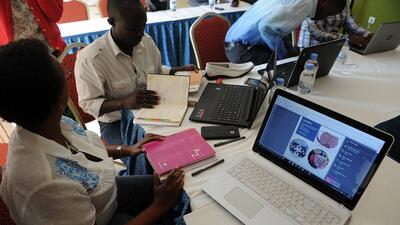
ITC and e-Residency of Estonia call on e-commerce platforms open up to entrepreneurs in developing countries (en)
The International Trade Centre (ITC) and the Estonian government's e-Residency programme have called on online marketplaces and compliance institutions to work together on solutions that support transparency, protect consumers, and promote open and fair access to entrepreneurs from outside the European Union, particularly those from developing countries.
The call came during Building Bridges to New e-Commerce Markets, an online event hosted by ecomConnect, ITC's e-commerce programme, on 20 October 2020.
- Representatives from Estonia's e-Residency programme and a delegation of experts in international e-commerce expressed concern that dominant e-commerce platforms and payment solution providers may be acting against the interest of entrepreneurs in developing countries.
- By taking a harsh and inflexible stance on the interpretation of Know Your Customer (KYC) principles, some platforms are increasingly shutting the door on bona fide businesses based outside their operating countries, the experts said.
'We call on platforms to apply KYC principles in a more consistent and equal manner, to be more transparent when dealing with particular cases, and engage with us to find a mutually beneficial solution for the whole sector,' said Hannah Brown, Head of Content, Estonian Government e-Residency programme.
'Although based on good intentions of risk management, the current state of affairs means that reputable entrepreneurs from outside the European Union are being shut out,' she added.
Speakers at the ITC event agreed that blanket approaches adopted to block participation in e-commerce through foreign-registered business structures are potentially discriminatory and fail to fully account for the compliance structures in existence, including among partner institutions in the e-Residency programme.
'A cross-industry discussion needs to take place for how sellers from outside the EU, in particular those from developing countries, can gain access to online markets while respecting compliance with fiscal and consumer protection requirements,' said Anders Aeroe, Director, Division of Enterprises and Institutions at ITC.
'We do not believe that the best way is simply to shut the door. And we would hope to have the support of the platforms in improving information and consultation.'
Participants at the online event concluded that a cross-industry group should work with the platforms to establish clearer and fairer principles and policies, beginning with being listened to.
Restricted access to payment services and online marketplaces is a serious obstacle that can block many small and medium-sized enterprises from engaging in e-commerce.
The COVID-19 crisis has thrown the problem into the spotlight as small businesses worldwide turn to e-commerce to help them survive. For many in the developing world, this period has marked their entry into trading online. Beyond survival, many are looking to grow their local and international markets.
But being able to access marketplaces is not the same as selling online - most businesses remain blocked from doing so because of their origin, and e-commerce platforms are hardly addressing the issue.
To have businesses overcome these obstacles, ITC and e-Residency launched Building Bridges to New E-commerce Markets: a Blueprint for Small and Medium-Sized Enterprises at the 20 October event.
The jointly published paper shows enterprises in developing countries how to set up international business structures so they can use competitive e-commerce services that are only available in developed countries.
The benefits of doing this are numerous: businesses can gain more control over their distribution arrangements, better account for and pay duties and taxes, achieve higher margins and operate as if they were local to target markets.
About Estonian Government E-residency Programme
E-Residency is an Estonian Government-backed digital solution for e-commerce entrepreneurs wanting to access the EU market legitimately and securely. With the support of an ecosystem of trusted business service partners, personally verified entrepreneurs worldwide can establish a company in the European Union and join e-commerce and payment platforms: a commonplace practice in other regions and increasingly underpins global commerce. Yet, entrepreneurs from countries in Africa, Central Asia and Eastern Europe, Latin America and parts of Asia, who have invested in European business structures, and have passed the compliance tests of European service vendors, continue to have their online presence shut down at no notice, with limited or no recourse.
About ITC ecomConnect Programme
ITC ecomConnect is the e-commerce programme of the International Trade Centre, addressed at small and medium-sized enterprises in developing and least developed countries, helping them achieve success through training and coaching, innovative solutions, and improved collaboration and partnerships. A community platform for shared learning and networking, ecomConnect, was launched in early 2020 and offers access to a knowledge base, tools and online events.
About ITC
The International Trade Centre is the joint agency of the World Trade Organization and the United Nations. ITC assists small and medium-sized enterprises in developing and transition economies to become more competitive in global markets, thereby contributing to sustainable economic development within the frameworks of the Aid-for-Trade agenda and the United Nations' Sustainable Development Goals.
For more information, visit www.intracen.org.
Follow ITC on Twitter | Facebook | LinkedIn | Instagram | Flickr
For media enquires, please contact:
Vittorio Cammarota
Chief, Communications and Events
International Trade Centre
T: +41 22 730 0322
E: vcammarota [at] intracen.org (vcammarota[at]intracen[dot]org)













